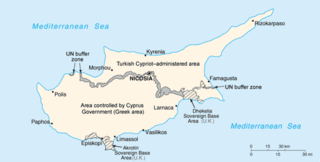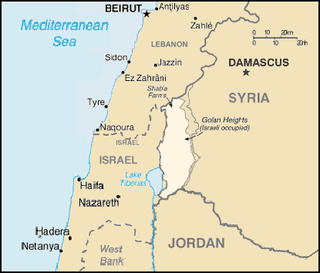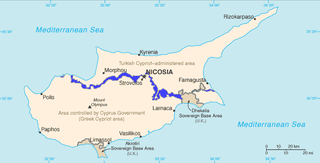
United Nations Security Council Resolution 391, adopted on June 15, 1976, noted a report of the Secretary-General that, due to the existing circumstances, the presence of the United Nations Peacekeeping Force in Cyprus would continue to be essential for a peaceful settlement. The report further noted that the force, as well as its civil police were restricted in the north of the island and expressed its concerns regarding actions which could heighten tensions.

United Nations Security Council Resolution 401, adopted on December 14, 1976, noted a report of the Secretary-General that, due to the existing circumstances, the presence of the United Nations Peacekeeping Force in Cyprus would continue to be essential for a peaceful settlement. The Council expressed its concerns regarding actions which could heighten tensions, and asked the Secretary-General to report back again before April 30, 1977 to follow the implementation of the resolution.

United Nations Security Council Resolution 410, adopted on June 15, 1977, noted a report of the Secretary-General that, due to the existing circumstances, the presence of the United Nations Peacekeeping Force in Cyprus would continue to be essential for a peaceful settlement. The Council expressed its concerns regarding actions which could heighten tensions, and asked the Secretary-General to report back again before November 30, 1977 to follow the implementation of the resolution.

United Nations Security Council Resolution 422, adopted on December 15, 1977, noted a report of the Secretary-General that, due to the existing circumstances, the presence of the United Nations Peacekeeping Force in Cyprus would continue to be essential for a peaceful settlement. The Council expressed its concerns regarding actions which could heighten tensions, and asked the Secretary-General to report back again before May 31, 1978 to follow the implementation of the resolution.

United Nations Security Council Resolution 429, adopted on May 31, 1978, considered a report by the Secretary-General regarding the United Nations Disengagement Observer Force. The Council noted its efforts to establish a durable and just peace in the Middle East but also expressed its concern over the prevailing state of tension in the area.

United Nations Security Council Resolution 443, adopted on December 14, 1978, noted a report of the Secretary-General that, due to the existing circumstances, the presence of the United Nations Peacekeeping Force in Cyprus would continue to be essential for a peaceful settlement. The Council expressed its concerns regarding actions which could heighten tensions, and asked the Secretary-General to report back again before May 31, 1979, to follow the implementation of the resolution.

United Nations Security Council Resolution 451, adopted on 15 June 1979, noted a report of the Secretary-General that, due to the existing circumstances, the presence of the United Nations Peacekeeping Force in Cyprus (UNFICYP) would continue to be essential for a peaceful settlement.

United Nations Security Council Resolution 458, adopted on 14 December 1979, noted a report of the Secretary-General that, due to the existing circumstances, the presence of the United Nations Peacekeeping Force in Cyprus (UNFICYP) would continue to be essential for a peaceful settlement. The council expressed its concerns regarding actions which could heighten tensions, and asked the Secretary-General to report back again before 31 May 1980 to follow the implementation of the resolution.

United Nations Security Council Resolution 472, adopted on 13 June 1980, noted a report of the secretary-general that, due to the existing circumstances, the presence of the United Nations Peacekeeping Force in Cyprus (UNFICYP) would continue to be essential for a peaceful settlement. The council expressed its concerns regarding actions which could heighten tensions, and asked the Secretary-General to report back again before 30 November 1980 to follow the implementation of the resolution.

United Nations Security Council Resolution 482, adopted on 11 December 1980, noted a report of the Secretary-General that, due to the existing circumstances, the presence of the United Nations Peacekeeping Force in Cyprus (UNFICYP) would continue to be essential for a peaceful settlement. The council expressed its desire for all parties to support the ten-point agreement for the resumption of intercommunal talks, and asked the Secretary-General to report back again before 31 May 1981 to follow the implementation of the resolution.

United Nations Security Council Resolution 486, adopted on 4 June 1981, noted a report of the Secretary-General that, due to the existing circumstances, the presence of the United Nations Peacekeeping Force in Cyprus (UNFICYP) would continue to be essential for a peaceful settlement. The council expressed its desire for all parties to support the ten-point agreement for the resumption of intercommunal talks, and asked the Secretary-General to report back again before 30 November 1981 to follow the implementation of the resolution.

United Nations Security Council resolution 526, adopted unanimously on 14 December 1982, noted a report of the secretary-general that, due to the existing circumstances, the presence of the United Nations Peacekeeping Force in Cyprus (UNFICYP) would continue to be essential for a peaceful settlement. The council expressed its desire for all parties to support the ten-point agreement for the resumption of intercommunal talks, and asked the Secretary-General to report back again before 31 May 1983 to follow the implementation of the resolution.

United Nations Security Council resolution 559, adopted unanimously on 14 December 1984, noted a report of the secretary-general that, due to the existing circumstances, the presence of the United Nations Peacekeeping Force in Cyprus (UNFICYP) would continue to be essential for a peaceful settlement. The council expressed its desire for all parties to support the ten-point agreement for the resumption of intercommunal talks, and asked the secretary-general to report back again before 31 May 1985, to follow the implementation of the resolution.

United Nations Security Council Resolution 646, adopted unanimously on December 14, 1989, noted a report of the Secretary-General that, due to the existing circumstances, the presence of the United Nations Peacekeeping Force in Cyprus (UNFICYP) would continue to be essential for a peaceful settlement. The Council expressed its desire for all parties to support the ten-point agreement for the resumption of intercommunal talks, and asked the Secretary-General to report back again before May 31, 1990, to follow the implementation of the resolution.

United Nations Security Council resolution 657, adopted unanimously on 15 June 1990, noted a report of the secretary-general that, due to the existing circumstances, the presence of the United Nations Peacekeeping Force in Cyprus (UNFICYP) would continue to be essential for a peaceful settlement. The council expressed its desire for all parties to support the ten-point agreement for the resumption of intercommunal talks, and asked the secretary-general to report back again before 30 November 1990, to follow the implementation of the resolution.

United Nations Security Council resolution 680, adopted 14 December 1990, noted a report of the Secretary-General that, due to the existing circumstances, the presence of the United Nations Peacekeeping Force in Cyprus (UNFICYP) would continue to be essential for a peaceful settlement. The Council asked the Secretary-General to report back again before 31 May 1991, to follow the implementation of the resolution.

United Nations Security Council resolution 697, adopted unanimously on 14 June 1991, noted a report of the Secretary-General that, due to the existing circumstances, the presence of the United Nations Peacekeeping Force in Cyprus (UNFICYP) would continue to be essential for a peaceful settlement. The Council asked the Secretary-General to report back again before 30 November 1991, to follow the implementation of the resolution.

United Nations Security Council resolution 759, adopted unanimously on 12 June 1992, noted a report of the Secretary-General that, due to the existing circumstances, the presence of the United Nations Peacekeeping Force in Cyprus (UNFICYP) would continue to be essential for a peaceful settlement. The Council asked the Secretary-General to report back again before 30 November 1992, to follow the implementation of the resolution.

United Nations Security Council resolution 796, adopted unanimously on 14 December 1992, noted a report of the Secretary-General that, due to the existing circumstances, the presence of the United Nations Peacekeeping Force in Cyprus (UNFICYP) would continue to be essential for a peaceful settlement. The Council asked the Secretary-General to report back again before 31 May 1993, to follow the implementation of the resolution.

United Nations Security Council resolution 839, adopted unanimously on 11 June 1993, noted a report of the Secretary-General that, due to the existing circumstances, the presence of the United Nations Peacekeeping Force in Cyprus (UNFICYP) would continue to be essential for a peaceful settlement. The Council asked the Secretary-General to report back again before 15 November 1993, to follow the implementation of the resolution.






